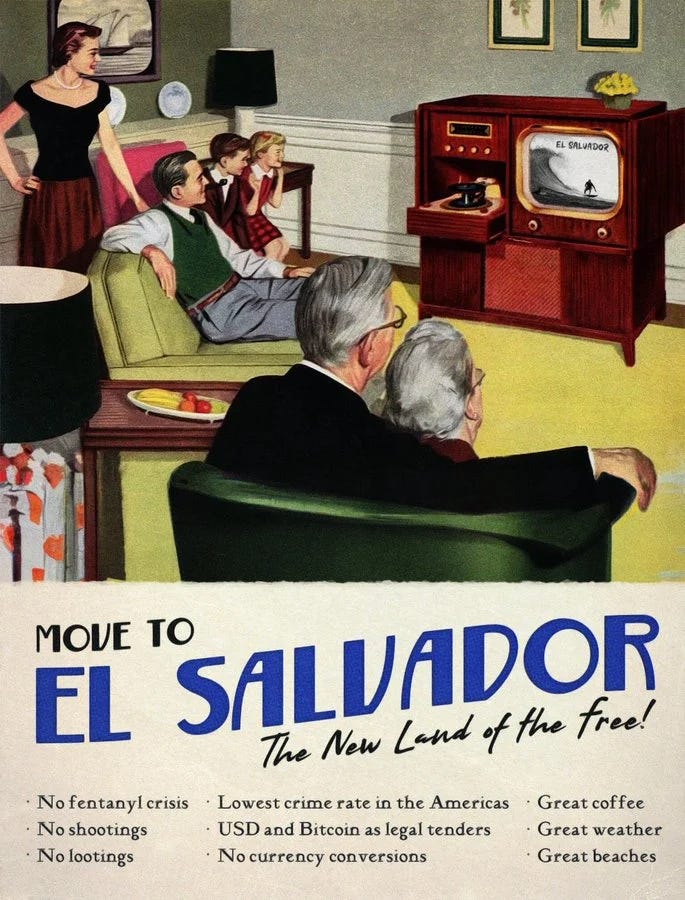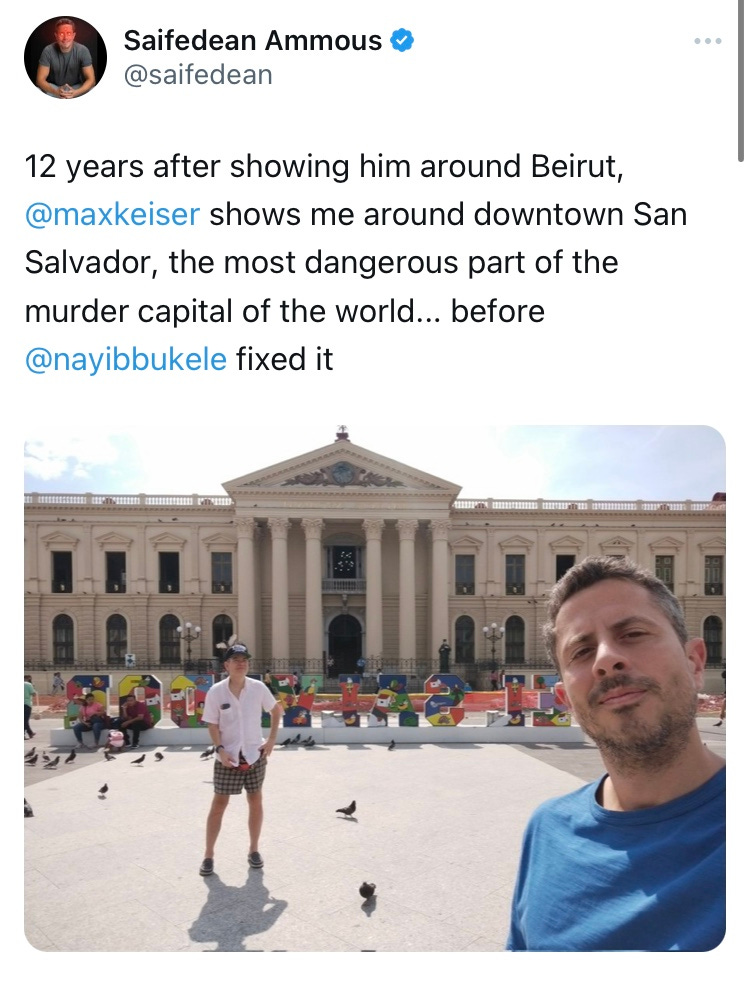
Back in November of last year, I recounted my recent experience in El Salvador.
I was quite clear about how I was happy to see that Salvadorans now feel safe and free to go about their lives in their home country.
I still feel this way and stand by what I wrote in that piece, but in light of certain information I’ve received, I feel the need to put the word “most” in front of “Salvadorans”, because some Salvadorans are currently less free than they were prior to Bukele’s coming to power.
Before I continue, though, please note that I do not share any of the information in this piece from any sort of moral high ground — especially as a US citizen.
I live in a country that was founded in part on genocide and slavery — a country that may no longer be carrying out genocide on its own soil but that’s still financing it elsewhere.
This same country also has a long history of supporting atrocities in Latin America — including in El Salvador specifically.
At the same time, I’m aware of the many redeeming qualities of the United States — one of which being that I’m free to write this newsletter — which brings me to the point I’d like to make with this piece…
It’s best to look at what’s happening in El Salvador with nuance — to look closely at not only the positive changes that have recently occurred in the country but the negative ones, as well.
With that, let me begin.
The Story of Rubén Ignacio Zamora
Someone with whom I’m very close and who’s spent years of their life working with those of lower socioeconomic status in Central America recently brought to my attention the injustice that is currently being perpetrated against Rubén Ignacio Zamora.
Zamora is a Salvadoran lawyer, an ex-presidential candidate in El Salvador, a former member of the country’s Legislative Assembly and the country’s former ambassador to the White House.
From what I’ve read and have been told, he’s been one of the more respected voices in Salvadoran politics for decades.
He’s also been outspoken about some of Bukele’s authoritarian tendencies.
Toward the end of this past December, a judge issued a warrant against Zamora (and other former government officials) for covering up for the perpetrators of the El Mozote massacre, a tragic event in which the members of Salvadoran army murdered residents of the village of El Mozote because these residents were suspected of associating with the political left.
The judge claims that Zamora took part in covering up this massacre as one of the signees for the law of amnesty approved by the Legislative Assembly of El Salvador in 1993, during a time when Zamora was a part of the assembly’s board of directors. (This law of amnesty was part of the cover up.)
The issue, though, is that Zamora never signed that decree.
Zamora’s daughter has made the case that the judge is taking political action against her father due to his being in opposition to the Bukele administration.
Bukele has been investigating Zamora for over three years and hasn’t come up with any legitimate evidence to imprison him. Some say that what Bukele is doing now is just the latest effort to get Zamora out of the picture.
From what I’ve been told, Zamora may have to flee El Salvador in efforts to preserve his safety, and this doesn’t sit right with me.
Granted, I don’t know everything that’s gone on between Zamora and Bukele, but, in a free and open society, you don’t try to imprison political rivals because you disagree with their critique of you.
And from what I’ve read and been told, Zamora’s story is not unique. There are other former officials in the country who have been put in a similar situation or who have been locked up.
Hostile Takeover
When I first wrote about Bukele in 2021, I brought up how he has employed authoritarian tactics since he’s been elected, including firing five key members of El Salvador’s Supreme Court as well as its Attorney General soon after taking power.
It seems that disempowering — and now weaponizing — the judiciary is a part of Bukele’s strategy.
Eight months ago, he oversaw the imprisonment of almost 70,000 gang members without allowing any of them due process. While supposedly each of these gang members had a tattoo signifying that they’d killed someone as part of an initiation ritual, not giving citizens due process is a troubling sign.
And it’s quite important to note that Zamora is a far cry from a gang member.
Speaking Quietly
While I was in El Salvador, some of the people with whom I met there — both locals and visitors — quietly shared in private conversation what they know about some of Bukele’s more authoritarian actions.
Very few speak publicly about this.
For locals, I assume this is because they might fear for their safety if they speak out against the government. For visitors, I assume this is because they want to do business in El Salvador and/or expect to return.
Whatever people’s reasons are, many are aware of the trade-offs that have come with being able to walk the streets without fear of being robbed, hurt or murdered. I can’t blame Salvadorans for appreciating this newfound safety, especially after the decades of violence they’ve endured.
But I’m happy to be more critical of the outsiders who are in the country.
‘Bitcoiners’ in El Salvador
In the wake of Bukele’s crackdown on gangs, Saifedean Ammous, author of the seminal book, The Bitcoin Standard: The Decentralized Alternative to Central Banking, a self-proclaimed “anarcho-capitalist” — a type of Libertarian that’s extremely anti-state (because of the state’s ability to commit violence against its citizens) — visited El Salvador.
I found it odd to see an anarcho-capitalist praising a leader who’s recently taken such hostile and unilateral actions against his citizens.
So, I asked him the following question:
(Yes, I’m a fan of some of Saifedean’s work, though, I don’t see eye-to-eye with him on some issues. No, I’m not an anarcho-capitalist.)
What I got from Saifedean in response to my question was radio silence. (It is possible he simply didn’t see the question.)
Instead, Max Kaiser, long-time Bitcoin evangelist and now one of Bukele’s advisors, chimed in:
I appreciated Max’s honesty. However, in retrospect, I would have asked him to answer the question I asked Saifedean, as well.
I believe now Saifedean is also an advisor to Bukele. Kind of weird that someone who wants to do away with the state would advise the head of one.
Bukele Is not Jesus
I’ve met Max on a few occassions, and I follow him on X. I do have to say, he is one funny cat. And I also appreciate all he’s done for Bitcoin from the very, very early days of its existence.
He was THE early evangelist, and he’s correctly predicted much of what has come to fruition with Bitcoin.
But there are some things he does that he should stop doing. These include:
Paralleling Bukele to Jesus, which I’ve seen him do in person
Talking about how he’s learned so much about how to take direction from God from Bukele (who claims he takes direction from God)
In Human Action: A Treatise on Economics — a seminal text in the Austrian school of economics, the school of economics that informed Bitcoin’s design — the book’s author, Ludwig von Mises, shares that you should be wary of leaders who claim they are taking direction from a higher power.
Maybe Max needs to go back and read this text.
Stacy Isn’t Interested
Stacy Herbert, Max’s wife, is also an advisor to Bukele. I believe she actually runs the federal Bitcoin office in El Salvador, which is very cool.
I’ve met Stacy on a few occassions, and I agree with her that Bitcoin has the power to bring about a new, global renaissance (hence, the name of this newsletter/my podcast — new renaissance capital).
Stacy has shared some of my work, which I very much appreciate, and she’s been nice each of the times that I’ve met her.
However, I was a bit disappointed when I was told that she isn’t interested in having the upcoming presidential election in El Salvador audited by the same third party that both audited and preserved the integrity of Guatemala’s recent election using none other than the Bitcoin blockchain. (I wrote more about this in here: “Bitcoin Bolsters Human Rights & Democracy”.)
I’m not sure why she isn’t interested (if my source is correct in saying she isn’t), but it’s disheartening to know that she doesn’t want a tool that she advocates so passionately for to be used to preserve the integrity of El Salvador’s upcoming election.
Growing Tired
In the wake of hearing this news about Zamora, I’ve grown a bit tired of hearing the likes of Max and Stacy go on and on about how great Bitcoin and Bukele are.
I respect them for standing by their commitment to Bitcoin, but I’d love to see them advocate a bit more for the things that Bitcoin is supposed to represent — one of which is freedom from state oppression.
If they really believed in this tenet of the Bitcoin ethos, they’d be speaking out on behalf of Zamora — an innocent Salvadoran — as much as they speak out on behalf of Bitcoin and Bukele.
Think for Yourself
As I said toward the onset of this piece, I wrote this to present another side of the narrative I originally presented. And I also wrote it to encourage you to think for yourself.
The worlds of both Bitcoin and politics are filled with propaganda, and it’s important to be able to see through this propaganda in efforts to find some semblance of the nuanced and often complicated truth.
While I’m a fierce advocate for Bitcoin, I do the best I can to stay away from a lot of the group think in the Bitcoin space and have grown quite averse to some of the mindless cheerleading that goes on in it.
I like many things that Bukele has done for El Salvador.
I commend his foresight in making El Salvador the first country in the world to adopt bitcoin as legal tender. (It’s also worth noting that full-fledged authoritarians around the world despise Bitcoin and outlaw it in their countries as opposed to making it legal tender.)
I’m happy Salvadorans feel physically safer in their homeland (despite my reservations about how this was accomplished).
And the efforts Bukele’s making to attract enterprise to his country are very cool.
However, I dislike other things he’s done. Unchecked unilateral actions are very dangerous, as is bypassing and weaponizing the judiciary.
With all of this said, I can’t pretend to imagine how difficult his job is or what it’s like to be in his shoes, but I know also know that injustice is injustice and it usually only gets worse if no one speaks up. So, here I am, speaking up.
I hope that Bukele can find it within himself to treat fellow Salvadorans like Rubén Ignacio Zamora with the dignity they deserve.
If he can do this, he’ll be setting an incredible example as both a head of state and a very popular figure in the Bitcoin community.
If he can’t, then many in the Bitcoin space are going to have to figure out a way to reconcile the fact that Bukele and some other big name ‘Bitcoiners’ may be operate more from an authoritarian playbook than an Austrian one.
Best,
Frank
Nostr | X | LinkedIn | YouTube | Instagram | Spotify | Apple Podcasts | Fountain







Totally agree with you Jeremy!
This was a fantastic article! We need more of this content in the world.